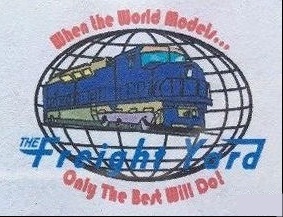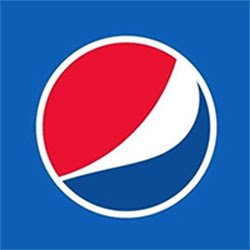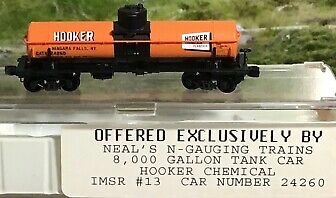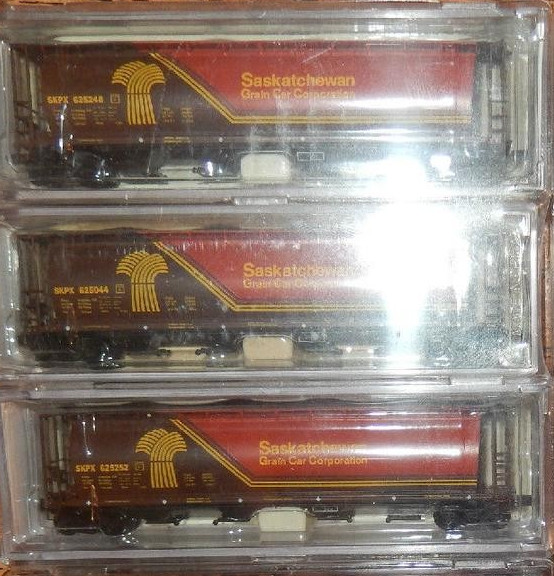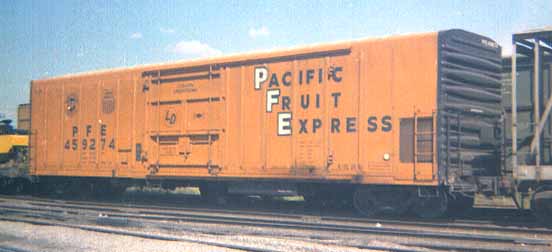Specific Item Information: Pepsi Series No. 4, Circa 1960-69
Model Information: Introduced in May of 1983, Micro-Trains has produced 57 different versions of this car through March of 2016, making it about 1% (or slightly above average) of their production. The car represents a fairly common prototype: 50 foot, double-door, exterior post box car. Like most sliding door models produced by Micro-Trains, the doors on this model do open.
Prototype History: While the 40-foot boxcar was a standard design, and it did come in different setups depending on the type of freight being transported, it was not large enough for efficient mass commodity transportation. The 50-foot boxcar made its first appearance in the 1930s and steadily grew in popularity over the years, which further improved redundancies by allowing for even more space within a given car. Today, the 50-footer remains the common boxcar size. After the second world war ended, and steel became once again readily available, steel became the go-to choice for construction of boxcars. Pullman Standard and ACF were some of the most prolific builders of these cars.
These cars came in many variations. For instance, double-doors became practical for large/wide loads, end-doors useful for very large lading such as automobiles, and interior tie-down equipment was helpful in keeping sensitive products from being damaged in-transit. In 1954 the Santa Fe developed its "Shock Control" (and later "Super Shock Control") technology for new boxcars with upgraded suspension systems to further improve the ride-quality and reduce the chance of damaging freight.
In the 1960s, the flush, "plug" style sliding door was introduced as an option that provides a larger door to ease loading and unloading of certain commodities. The tight-fitting doors are better insulated and allow a car's interior to be maintained at a more even temperature.
These cars came in many variations. For instance, double-doors became practical for large/wide loads, end-doors useful for very large lading such as automobiles, and interior tie-down equipment was helpful in keeping sensitive products from being damaged in-transit. In 1954 the Santa Fe developed its "Shock Control" (and later "Super Shock Control") technology for new boxcars with upgraded suspension systems to further improve the ride-quality and reduce the chance of damaging freight.
In the 1960s, the flush, "plug" style sliding door was introduced as an option that provides a larger door to ease loading and unloading of certain commodities. The tight-fitting doors are better insulated and allow a car's interior to be maintained at a more even temperature.
Road Name History: PepsiCo, Inc. is an American multinational food, snack and beverage corporation headquartered in Purchase, New York, United States, with interests in the manufacturing, marketing, and distribution of grain-based snack foods, beverages, and other products. PepsiCo was formed in 1965 with the merger of the Pepsi-Cola Company and Frito-Lay, Inc. PepsiCo has since expanded from its namesake product Pepsi to a broader range of food and beverage brands, the largest of which includes an acquisition of Tropicana in 1998 and of Quaker Oats in 2001, which added the Gatorade brand to its portfolio.
As of January 26, 2012, 22 of PepsiCo's brands generated retail sales of more than $1 billion apiece,[2] and the company's products were distributed across more than 200 countries, resulting in annual net revenues of $43.3 billion. Based on net revenue, PepsiCo is the second largest food and beverage business in the world. Within North America, PepsiCo is the largest food and beverage business by net revenue.
Indra Krishnamurthy Nooyi has been the chief executive of PepsiCo since 2006. The company's beverage distribution and bottling is conducted by PepsiCo as well as by licensed bottlers in certain regions. Approximately 274,000 employees generated $66.415 billion in revenue as of 2013.
From Wikipedia
As of January 26, 2012, 22 of PepsiCo's brands generated retail sales of more than $1 billion apiece,[2] and the company's products were distributed across more than 200 countries, resulting in annual net revenues of $43.3 billion. Based on net revenue, PepsiCo is the second largest food and beverage business in the world. Within North America, PepsiCo is the largest food and beverage business by net revenue.
Indra Krishnamurthy Nooyi has been the chief executive of PepsiCo since 2006. The company's beverage distribution and bottling is conducted by PepsiCo as well as by licensed bottlers in certain regions. Approximately 274,000 employees generated $66.415 billion in revenue as of 2013.
From Wikipedia
Brand/Importer Information: The Freight Yard was a hobby shop that did custom decoration and special runs of other manufacturers' N Scale products. It sold its custom products under several brands or collections: Premiere Editions, by The Freight Yard and Dreams Design.
It was located in Anaheim, California and then moved to 2006 in Phoenix, Arizona.
Established in the late 1980s, it stopped business under this name by the end of the 2000s.
The Freight Yard was owned and operated by Darren J. Cohen. Darren is now operating North Valley Trains.
The Freight Yard / Premiere Editions runs are usually available in series of two to twelve different numbers (suffixed A to M, with I not used).
The first two digits of the stock number correspond to the release year (9x being 199x, and 2x being 200x).
It was located in Anaheim, California and then moved to 2006 in Phoenix, Arizona.
Established in the late 1980s, it stopped business under this name by the end of the 2000s.
The Freight Yard was owned and operated by Darren J. Cohen. Darren is now operating North Valley Trains.
The Freight Yard / Premiere Editions runs are usually available in series of two to twelve different numbers (suffixed A to M, with I not used).
The first two digits of the stock number correspond to the release year (9x being 199x, and 2x being 200x).
Manufacturer Information:  Micro-Trains Line split off from Kadee Quality Products in 1990. Kadee Quality Products originally got involved in N-Scale by producing a scaled-down version of their successful HO Magne-Matic knuckle coupler system. This coupler was superior to the ubiquitous 'Rapido' style coupler due to two primary factors: superior realistic appearance and the ability to automatically uncouple when stopped over a magnet embedded in a section of track. The success of these couplers in N-Scale quickly translated to the production of trucks, wheels and in 1972 a release of ready-to-run box cars.
Micro-Trains Line split off from Kadee Quality Products in 1990. Kadee Quality Products originally got involved in N-Scale by producing a scaled-down version of their successful HO Magne-Matic knuckle coupler system. This coupler was superior to the ubiquitous 'Rapido' style coupler due to two primary factors: superior realistic appearance and the ability to automatically uncouple when stopped over a magnet embedded in a section of track. The success of these couplers in N-Scale quickly translated to the production of trucks, wheels and in 1972 a release of ready-to-run box cars.
Micro-Trains Line Co. split off from Kadee in 1990 to form a completely independent company. For this reason, products from this company can appear with labels from both enterprises. Due to the nature of production idiosyncrasies and various random factors, the rolling stock from Micro-Trains can have all sorts of interesting variations in both their packaging as well as the products themselves. When acquiring an MTL product it is very important to understand these important production variations that can greatly enhance (or decrease) the value of your purchase.
Please consult our Micro-Trains Collector's Guide

Micro-Trains Line Co. split off from Kadee in 1990 to form a completely independent company. For this reason, products from this company can appear with labels from both enterprises. Due to the nature of production idiosyncrasies and various random factors, the rolling stock from Micro-Trains can have all sorts of interesting variations in both their packaging as well as the products themselves. When acquiring an MTL product it is very important to understand these important production variations that can greatly enhance (or decrease) the value of your purchase.
Please consult our Micro-Trains Collector's Guide
Item created by: Alain LM on 2022-06-11 12:07:26. Last edited by Alain LM on 2022-06-11 12:08:07
If you see errors or missing data in this entry, please feel free to log in and edit it. Anyone with a Gmail account can log in instantly.
If you see errors or missing data in this entry, please feel free to log in and edit it. Anyone with a Gmail account can log in instantly.




